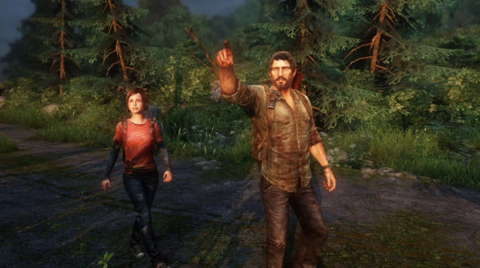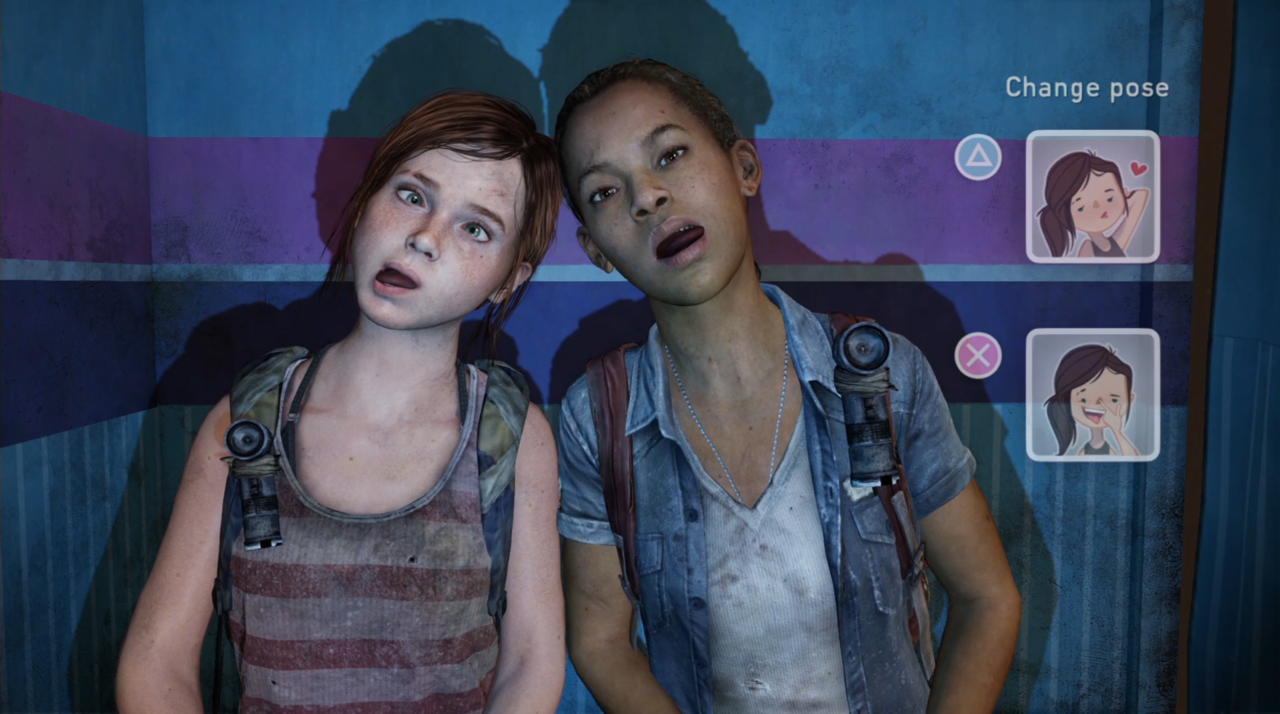What makes life worth living? The Last of Us tries to answer that question by giving us a vision of a world that makes no room for people to really live their lives anymore. In this post-pandemic military-ruled society, the most anyone can hope for is merely to survive. And as many characters in the game know, in a world where the survival of anyone from one day to the next is uncertain, attachments, connections, love--these things can become liabilities. These things can destroy you.
Naughty Dog's acclaimed action game has made its way to the PlayStation 4 as The Last of Us Remastered, and if you've played the game on the PlayStation 3, you'll probably notice that it runs at a higher frame rate and that the lighting is richer and moodier in this release. In side-by-side comparisons, it also becomes apparent that the textures are sharper and the draw distance has been increased. But the reality is that the game already looked so good on the PlayStation 3 that the visual enhancements can't do all that much to improve your experience. The Last of Us Remastered is still The Last of Us, and that is no bad thing. It's one of the best adventures of the last console generation, and it's fully deserving of the special-edition treatment it gets here.
Perhaps nobody knows the dangers of loving others in this uncertain world better than Joel, the protagonist of The Last of Us. A hard, bitter man, Joel isn't likable, but he is at least understandable, in large part because the dialogue in The Last of Us is so human and believable. And although that humanity comes through in all of the game's major characters, it's the teenager Ellie who is the game's emotional heart. In contrast to Joel's cynicism, Ellie is still capable of wide-eyed wonder. While Joel seems dead inside, Ellie is very much alive, and over the course of the game, neither Joel, nor you, can avoid growing attached to her.
Still, if you think too carefully about the importance the story places on the connection between these two characters, things start to fall apart a bit. Because The Last of Us is an action game that adheres to the established template of the genre, over the course of your journey you murder not just one or five or 12 people, but dozens and dozens of them, and it's questionable whether a man who treats the lives of so many of his fellow human beings as so disposable would really be capable of placing any meaningful importance on the life of one particular individual. You can't soil your hands with the blood of hundreds and still have room for love in your heart.
The story is set in a world where every human life is in constant danger, and the harrowing combat of the game supports this feeling. Whether you're fighting ordinary humans or infected ones, you're encouraged to rely on stealth, distracting enemies and sneaking up on them to save your precious supplies. But you're always on edge, aware that you might be spotted and that all hell will break loose. There's a gut-wrenching brutality and sense of desperation to the way Joel fights, bashing his enemies' faces into the environment or stomping them into a bloody mess. The Last of Us is not a game in which you can boldly charge at your enemies with guns blazing. Instead, you rummage through every abandoned house, store, and workplace looking for things you can use to craft weapons and health kits. This emphasis on scrounging for supplies helps ground the combat in the world of the game, a world in which nothing can be taken for granted.
Because every enemy poses a serious threat, there's a real fear of being spotted, or of an enemy coming at you from behind, so you try to stay aware of your surroundings. One type of infected, the clickers, see by using echolocation, and the sound of their clicking is unsettling enough to make your skin crawl. As in the PlayStation 3 version, the tension of combat is sometimes undermined when your allies behave erratically, doing things that would get you spotted and killed. But then there are moments in which your companions' behavior creates the feeling that you're not alone on this journey, such as when Ellie comes to your rescue by stabbing your assailant in the back.
You explore so many places--old pizzerias and coffee shops, hotels and record stores--all of them designed with an attention to detail that makes them feel like places where people once went about their lives.
The nerve-racking intensity of combat is mercifully not a constant throughout The Last of Us. The pacing of the game is excellent; this is a game that's willing to take its time, letting you just inhabit a moment and take in the atmosphere rather than constantly rushing you to the next explosive action sequence.
There's a melancholy beauty to the game's world that seeps into your heart in these quieter moments. On the one hand, your breath might be taken away by the sight of cities being slowly reclaimed by the lush greenery of nature, but on the other, it's hard to forget that this beauty tells the story of the decline of humankind. You explore so many places--old pizzerias and coffee shops, hotels and record stores--all of them designed with an attention to detail that makes them feel like places where people once went about their lives. Even in its quietest moments, though, The Last of Us doesn't let you get too comfortable. The calm always gives way sooner or later to another frantic chase, terrifying siege, or other uncomfortable reminder that this world isn't nearly as tranquil as it sometimes seems to be.

The Last of Us Remastered includes the original game's multiplayer mode, along with all of the map packs that were released as downloadable content. The multiplayer successfully captures the unnerving feeling of the single-player combat, and wraps it up in an engaging metagame about trying to sustain a camp full of survivors by gathering supplies and completing specific tasks during missions. You can give the mode an extra emotional punch by linking it to your personal Facebook account, enabling you to see updates about your real-life friends dying as your camp flounders.
And then there's Left Behind, the extraordinary DLC story chapter for The Last of Us, unlocked here from the beginning. While the main game's narrative concerns with the importance of interpersonal connections and the gameplay's focus on combat and violence are somewhat at odds with each other, Left Behind takes the established mechanics of The Last of Us and uses them to support its story of the bond between Ellie and her friend Riley. Playing as Ellie, you and Riley toss bricks at car windows, hunt each other with water pistols, and do other things together, and all the while, the characters say honest things to each other, laugh with each other, get angry with each other, and do other things that real people do.
By giving you these glimpses of Ellie's doomed attempts to live something resembling a normal teenage life, Left Behind drives home what Ellie has lost as a person by growing up in this harsh world. The bond that forms between Ellie and Riley, supported both by the gameplay and by extraordinarily natural writing and acting, feels real. Left Behind crams more memorable moments into its short running time than you find in most full games, and it understands that some of the most important moments we share with others are the smallest: a brief glance, a fleeting smile. This remarkable DLC has real character development and real emotional payoff.

In addition to the visual enhancements and the inclusion of map packs and story DLC, The Last of Us Remastered has other nice little features, like a photo mode that lets you stop the action at any time, position the camera to your liking, and share the screenshot with others, applying frames and filters if you choose. And there are commentary tracks on in-game cinematics featuring the creative director and principal actors. The Last of Us is a great action game that you should play if you haven't already. And if you have played it before, the improvements here aren't so dramatic as to make the game feel like a new experience, but it is definitely one worth revisiting. In the world of The Last of Us, as in our own world, love might destroy you, but it's also one of the only things worth fighting for.

